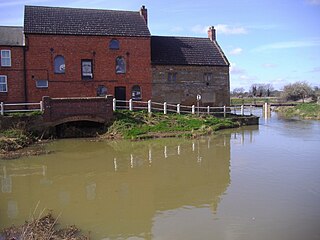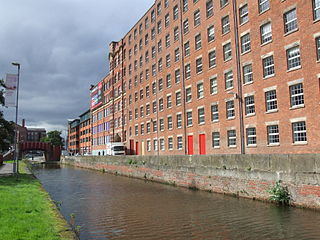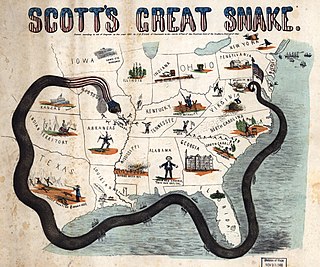
The American Civil War was a civil war in the United States. It was fought between the Union and the Confederacy, the latter formed by states that had seceded. The central cause of the war was the dispute over whether slavery would be permitted to expand into the western territories, leading to more slave states, or be prevented from doing so, which was widely believed would place slavery on a course of ultimate extinction.

The Industrial Revolution was the transition to new manufacturing processes in Great Britain, continental Europe, and the United States, that occurred during the period from around 1760 to about 1820–1840. This transition included going from hand production methods to machines; new chemical manufacturing and iron production processes; the increasing use of water power and steam power; the development of machine tools; and the rise of the mechanized factory system. Output greatly increased, and a result was an unprecedented rise in population and in the rate of population growth. The textile industry was the first to use modern production methods, and textiles became the dominant industry in terms of employment, value of output, and capital invested.

Cotton is a soft, fluffy staple fiber that grows in a boll, or protective case, around the seeds of the cotton plants of the genus Gossypium in the mallow family Malvaceae. The fiber is almost pure cellulose, and can contain minor percentages of waxes, fats, pectins, and water. Under natural conditions, the cotton bolls will increase the dispersal of the seeds.

The River Nene is a river in the east of England that rises from three sources in Northamptonshire. The river is about 105 miles (169 km) long, about 3.7 miles (6.0 km) of which forms the border between Cambridgeshire and Norfolk. It is the tenth-longest river in the United Kingdom, and is navigable for 88 miles (142 km), from Northampton to The Wash.

Francis Cabot Lowell was an American businessman for whom the city of Lowell, Massachusetts, is named. He was instrumental in bringing the Industrial Revolution to the United States.
The Textile Workers' Strike of 1934, colloquially known later as The Uprising of '34 was the largest textile strike in the labor history of the United States at the time, involving 400,000 textile workers from New England, the Mid-Atlantic states and the U.S. Southern states, lasting twenty-two days.

A cotton mill is a building that houses spinning or weaving machinery for the production of yarn or cloth from cotton, an important product during the Industrial Revolution in the development of the factory system.
The history of the Southern United States spans back thousands of years to the first evidence of human occupation. The Paleo-Indians were the first peoples to inhabit the Americas and what would become the Southern United States. By the time Europeans arrived in the 15th century, the region was inhabited by the Mississippian people, well known for their mound building cultures. European history in the region would begin with the earliest days of the exploration and colonization of North America. The countries of Spain, France, and England eventually explored and claimed parts of what is now the Southern United States, and the cultural influences of each can still be seen in the region today. In the centuries since, the history of the Southern United States has recorded a large number of important events, including the American Revolution, the War of 1812, the American Civil War, the expansion and then ending of slavery in the U.S., the First Great Migration, the Second Great Migration, the Jim Crow era, the American Civil Rights Movement, the 1996 Summer Olympics in Atlanta, and the economic and population transformation of the South during the mid-to-late 20th century. Following World War II, industrialization and economic growth further gained speed across the South. Since the late 20th century, the South has seen the arrival of many migrants from other U.S. regions, as well as different international immigrant groups.

The Lancashire Cotton Famine, also known as the Cotton Famine or the Cotton Panic (1861–65), was a depression in the textile industry of North West England, brought about by overproduction in a time of contracting world markets. It coincided with the interruption of baled cotton imports caused by the American Civil War and speculators buying up new stock for storage in the shipping warehouses at the entrepôt. This, as well as causing cotton prices to rise in China, in which trade had been steadily increasing following the Second Opium War and during the ongoing Taiping Rebellion. The increase in cotton prices caused the textile trade to rapidly lose two-thirds of its previous value of exports to China from 1861-1862.

The Union blockade in the American Civil War was a naval strategy by the United States to prevent the Confederacy from trading.
"King Cotton" is a slogan that summarized the strategy used before the American Civil War by secessionists in the southern states to claim the feasibility of secession and to prove there was no need to fear a war with the northern states. The theory held that control over cotton exports would make a proposed independent Confederacy economically prosperous, would ruin the textile industry of New England, and—most importantly—would force the United Kingdom and perhaps France to support the Confederacy militarily because their industrial economies depended on Southern cotton. The slogan, widely believed throughout the South, helped in mobilizing support for secession: by February 1861, the seven states whose economies were based on cotton plantations had all seceded and formed the Confederacy. Meanwhile, the other eight slave states, with little or no cotton production, remained in the Union.

In the history of the Southern United States, the Antebellum Period spanned the end of the War of 1812 to the start of the American Civil War in 1861. The Antebellum South was characterized by the use of slavery and the culture it fostered. As the era proceeded, Southern intellectuals and leaders gradually shifted from portraying slavery as an embarrassing and temporary system, to a defense of slavery as a positive good, and harshly criticized the nascent abolitionist movement.
New England, being settled more than 150 years before the American Revolution. The first English colony in New England, Plymouth Colony, was established in 1620 by Pilgrims fleeing religious persecution in England; a French colony established in 1604 on Saint Croix Island, Maine, had failed. Plymouth was the second English colony in America, after Jamestown. A large influx of Puritans populated the greater region during the Puritan migration to New England (1620–1640), largely in the Boston and Salem area. Farming, fishing, and lumbering prospered, as did whaling and sea trading.

The Loray Mill strike of 1929 in Gastonia, North Carolina, was a notable strike action in the labor history of the United States. Though largely unsuccessful in attaining its goals of better working conditions and wages, the strike was considered successful in a lasting way; it caused an immense controversy which gave the labor movement momentum in the South.
The United Kingdom of Great Britain and Ireland remained officially neutral throughout the American Civil War (1861–1865). It legally recognized the belligerent status of the Confederate States of America (CSA) but never recognized it as a nation and neither signed a treaty with it nor ever exchanged ambassadors. Over 90 percent of Confederate trade with Britain ended, causing a severe shortage of cotton by 1862. Private British blockade runners sent munitions and luxuries to Confederate ports in return for cotton and tobacco. In Manchester, the massive reduction of available American cotton caused an economic disaster referred to as the Lancashire Cotton Famine. Despite the high unemployment, some Manchester cotton workers refused out of principle to process any cotton from America, leading to direct praise from President Lincoln, whose statue in Manchester bears a plaque which quotes his appreciation for the textile workers in "helping abolish slavery". Top British officials debated offering to mediate in the first 18 months, which the Confederacy wanted but the United States strongly rejected.
Curzon Mill, later known as Alger Mill was a cotton spinning mill in the Hurst district of Ashton-under-Lyne, Greater Manchester, in England. It was built between 1899 and 1902 for the Ashton Syndicate by Sydney Stott of Oldham. It was a sister mill to the Atlas Mill. It was sold to the Alger Spinning Co. Ltd in 1911, and closed in 1942. It was then used as a cigarette factory by the J.A. Pattreiouex company until 1966, and then sold to the Qualitex company for the production of artificial fibres. It was still spinning artificial fibres in the 1990s and was demolished in 1994; the site being used for a housing estate.

Brunswick Mill, Ancoats is a former cotton spinning mill on Bradford Road in Ancoats, Manchester, England. The mill was built around 1840, part of a group of mills built along the Ashton Canal, and at that time it was one of the country's largest mills. It was built round a quadrangle, a seven-storey block facing the canal. It was taken over by the Lancashire Cotton Corporation in the 1930s and passed to Courtaulds in 1964. Production finished in 1967.
Mortimer Grimshaw was an English political activist, strike leader and cotton weaver. He briefly attained national fame in the 1850s due to his part in the Preston strike of 1853–54. A large man whose face was marked by smallpox, he was renowned for his oratory, which earned him the nickname of the "Thunderer of Lancashire".
The diplomacy of the American Civil War involved the relations of the United States and the Confederate States of America with the major world powers during the American Civil War of 1861–1865. The United States prevented other powers from recognizing the Confederacy, which counted heavily on Britain and France to enter the war on its side to maintain their supply of cotton and to weaken a growing opponent. Every nation was officially neutral throughout the war, and none formally recognized the Confederacy.

Adam Brunskill is a 1952 historical novel by the British writer Thomas Armstrong. It was his fourth novel and as with much of his work focuses on Northern England. Drawing on the tradition of interwar regional writing of the area, it enjoyed significant popularity along with another new Armstrong novel King Cotton. It is the only major work to focus on the lead mining industry of the Yorkshire Dales.












